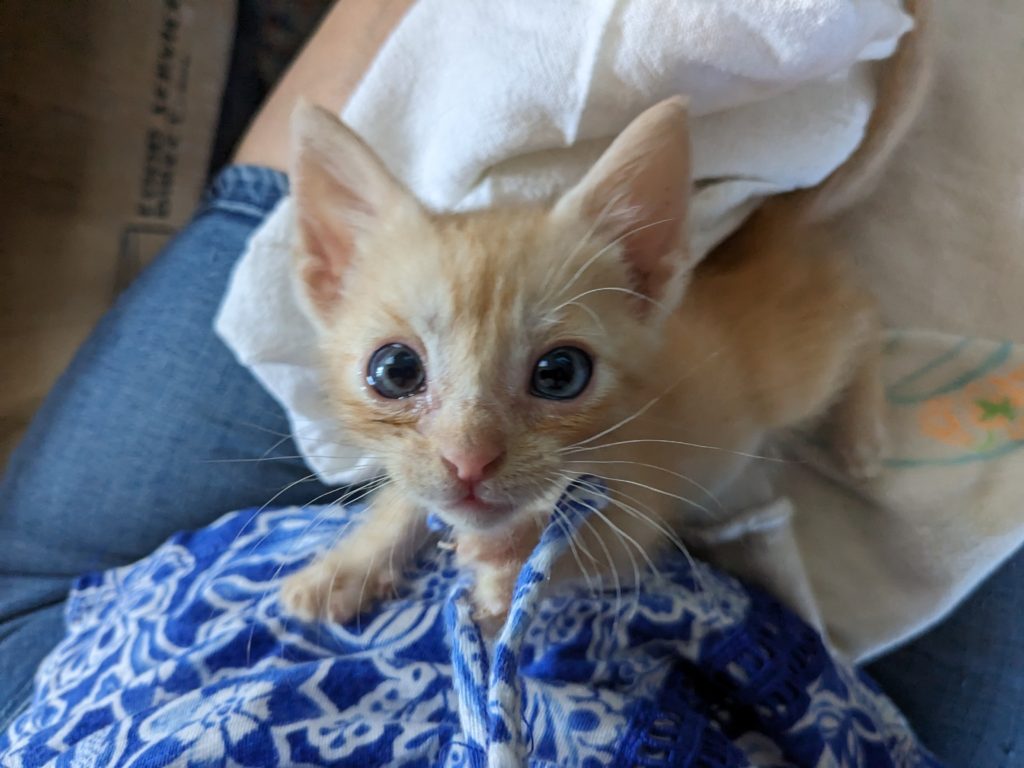He isn’t an alien but a baby kitten who can teach us all about love. He was abandoned by his mother and his liter mates didn’t survive. When he came to me he was eight weeks old and weighed 10 oz. My grandson said that he looked like an alien because how thin he was and how big his eyes were. I’m glad to report that in a week he has doubled his weight! The resident cat isn’t impressed but he is eating, sleeping and playing and barring anything tragic is likely going to have a chance.

Underweight Kitten and Love?
Want more love in your life? This can be done even if there isn’t more things to love in your life, but to love more of what you have in your life. That sounds odd. This is possible because of our lovely brain.
- Brains don’t come with biases over what we can love
- Brains create associations of things (people, places, events, items) and emotions
- Then the brain associates emotions to memories for recall
So what does an unweight kitten have to do with love?
One very common and powerful meditation that anyone can do to improve your feelings of love and compassion in your life is called Loving Kindness Meditation or Metta. The basic structure practiced in the west is to start with something easy to love to generate and foster the feelings of love, then move to other people from neutral to more negative. One of my favorite monks when it comes to loving kindness is Ajahn Brahm.
It is easy to love something that is easy to love like a baby kitten. Ajahn Brahm leads loving kindness meditations by choosing an easy to love object and for him it is a baby kitten one that hasn’t had it easy. It’s a sentiment that I can get behind as this baby kitten plays with his tail on my lap as I write this.
What is love?
What is love anyway? How do we know when we are in love?
Love like all the emotions start with a thought. Think of someone or something that you really love. As you picture this person in your mind and think of how much you love this person, you may smile and begin to feel changes in the body. Those changes and sensations are your response to loving thoughts that we call love.
Ajahn Brahm leads loving kindness mediations and starts with image a baby kitten or puppy, something easy to feel love towards. Then he spends a good portion of the instruction leading us through imagining finding this baby cold, hungry and hurt and how we feel such compassion and love towards it.
The idea is to connect to those feelings of love towards something that we want to help, protect and give it the best life possible. Then when we imagine this scene and practice these thoughts, we experience the emotions of love and compassion. We repeat, “may you be free from harm, be at peace, may you be happy and may you experience love.”
Let’s practice
First get in a comfortable position sitting or lying down where you won’t be disturbed. Then take a few deep breaths breathing deeply and slowly calming the body and the mind. Take a few moments to just pay attention to your breathing. Just notice the air at the tip of your nose as you breathe normally. It can be helpful to count in and out or say quietly to yourself “in” and “out” with your breathing.
Now imagine that you are outside and you hear a kitten mewing (or puppy or anything that is easy for you to connect with). You see that it is small, his fur is dirty and he seems scared and tiny. You try to go up to it but it cowers in the shadows and you can tell it is so scared. You bend down and reach for it and it tries to shrink away. All you want to do is help this poor baby. It seems to have had a hard life and it’s so hungry and you know you can help him.
You talk to him and slowly reach for him. “All I want to do for your little kitty is to show you the kindness that you haven’t gotten. I want to feed you and love you and protect you little kitty.” And the kitten let’s you pick him up. He is so thin and afraid. “I have food for you and warm blankets to wrap you.”
“I care for you little kitten. I love you little kitty and I will feed you so that you grow up strong.” As you love on the kitten he is slowly warming up and he begins to relax. He even begins to purr as you say, “May you accept my love, may you be free from harm. May you learn what it is to be loved.”
Loving something less easy
We have accessed the love of something easy to love to bring up the feelings of love. Now to expand those things that we can love. Here we are associating an emotion to someone.
We can associate loving kindness towards a neutral person. This could be someone like the mailperson or the clerk at the grocery store or a co-worker. We see them and yet don’t have a deep connection. Then while feeling the love and compassion we imagine them receiving love from us and repeat the manta, “May you be free from harm, may you be at peace, may you be happy and may you experience love.”
Let’s Practice – Neutral
Think of someone that you see often but don’t have a deep meaningful connection. It could be the delivery driver who brings all your Amazon goodies or the clerk at the grocery store. Take a moment and bring up their face and your interactions with them. Now as you imagine them think of the baby kitten and the feelings of love. Now say to this neutral person, “May you be free from harm, may you be at peace, may you be happy and may you experience love.” And repeat for several minutes as you breathe in and out wishing this person all the love and peace.
Showing love to ourselves
There are several other targets in metta or loving kindness meditations. For one, showing yourself loving kindness. Imagine yourself while feeling the love and compassion and then wish yourself peace, love and joy just like we would for a small defenseless kitten. It is up for debate which is harder holding loving kindness for ourselves or for someone we don’t care for. It is often strange how we will show compassion to others and then think and say vicious things to ourselves.
We can also develop some loving kindness for those that are hard to love. Warning, don’t pick someone that you have ugly thoughts and feelings towards. In the beginning chose someone that mildly irritates you. Stay clear of people who you harbor strong negative feelings towards such as the ex who cheated or an abusive parent or partner or the person who victimized you. Also do not chose someone with whom you are having current issues if those issues include abuse.
Let’s Practice – Ourselves and Negative
Allow the neutral person to leave your mind and once more bring up the kitten and imagine him growing strong and playing as you care for him, feed him and love him. Now focus instead of the kitten on you as you feed and care for this kitten. Now as you breathe in and out slowly and comfortably, wish yourself love and compassion. Repeat “May I be free from harm, may I be at peace, may I be happy and may I experience love.” And repeat for several minutes as you breathe in and out wishing yourself all the love and peace.
The last person that you may wish to show some kindness and compassion towards is someone that mildly negative towards you. Think of someone now that may annoy you. Refuse to pick someone who has abused you in the past or someone that you have a complicated relationship with. Choose someone that mildly ruffles your feathers so to speak.
Now as you picture them in your mind you may notice that you may begin to feel annoyance and instead wish them love and kindness as you did the baby kitten. Repeat, “May you be free from harm, may you be at peace, may you be happy, may you experience love.” And repeat for several minutes as you breathe in and out wishing this person all the love and peace.
The form you have selected does not exist.
Would you like to learn more about trauma and the brain? Click here for a free webinar. Yes, it really is free!
If you would like to know more about how to work with me, Click here.
I am including a metta meditation by Ajahn Brahm that you can listen to here.
 Skip to content
Skip to content


